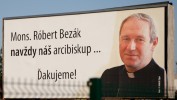O Movimento Internacional We are Church apóia o empenho do Papa Francisco em reformas substantivas na Igreja Católica Romana
Publicado, na terça-feira, 5 de novembro de 2013
PARA COMUNICADO IMEDIATO
O Movimento Internacional Somos Igreja põe-se de acordo, em Dublin, sobre uma agenda clara para os próximos anos
O Movimento Internacional Somos Igreja (IWAC) apóia o esforço do Papa Francisco por reformas substantivas na Igreja Católica Romana e pede aos bispos que apóiem claramente esse novo caminho por mais transparência, descentralização e diálogo com os fiéis. Quase oito meses após a eleição do Cardeal Jorge Mario Bergoglio, da Argentina, como Bispo de Roma, ele está pondo em marcha um novo caminho em Roma, a exemplo do questionário para o Sínodo sobre a Família, a realizar-se em Roma, em 2014, que foi publicado semana passada.
Representantes de 11 países da Europa (Áustria, Dinamarca, França, Alemanha, Irlanda, Itália, Holanda, Noruega, Portugal, Espanha, Reino Unido) e dos Estados Unidos estiveram reunidos no All Hallows College, em Dublin, Irlanda, de 1 a 3 de Novembro de 2013, para discutirem sua contrbuição ao atual processo de reforma da Igreja Católica Romana.
O IMWAC manifesta seu apreço por esse nova forma de consulta e pede aos Bispos que se empenhem em fazer com que os fiéis e as paróquias locais respondam diretamente a esse questionário. As conferências episcopais de todo o mundo fariam bem em em seguir o exexmplo da Conferência dos Bispos da Inglaterra e de País de Gales, que já pôs o questionário na internet, convidando os fiéis a enviarem as respostas para:
http://www.catholic-ew.org.uk/Home/Featured/Synod-of-Bishops-on-the-Family-2014
Algumas questões e formulações podem ser alvo de críticas. Portanto, o IMWAC vai ler cuidadosamente o questionário e preparar um Sínodo („Shadow Synod“), durante o Sínodo Extraordinário sobre a Família, a realizar-se em Roma, em outubro de 2014. „Este não deve ser um Sínodo no qual apenas bispos machos vivendo no celibato discutam a situação presente da vida familiar“, diz Martha Heizer de We are Church- Áustria, Coordenadora do IMWAC. “Pedimos que incluam no Sínodo especialistas e fiéis desde o início, podendo assim trazer suas experiências, de distintas formas da vida cristã, nos tempos de hoje.“ O IMWAC apóia a idéia de mulheres cardeais como um primeiro passo para a abertura a todos os ministérios também para as mulheres.
O IMWAC está consciente da forte resistência, especialmente no Vaticano, contra a implementação de reformas substanciais. Muitos bispos ainda relutam para seguir o novo caminho. Ainda não chegou a profunda crise de liderança na Igreja. Portanto, o IMWAC se decidiu por uma agenda clara para os próximos anos. Além do Sínodo („Shadow Synod“), o IMWAC junto com outros movimentos pela reforma está preparando uma estratégia para marcar, em 2015, a celebração do encerramento do Concílio Vaticano II.
Didier Vanhoutte, da França, fez um relato impressionante sobre sua visita à Ásia, onde contatou muitos grupos que têm semelhante urgência por reforma da doutrina e da abordagem pastoral da Igreja Católica Romana. Os movimentos do MWAC na América Latina, ainda que não presentes a este Encontro, são parte integrante deste movimento de reforma, especialmente com sua ênfase na justiça social.
Outras informações:
Brendan Butler, +353-86 4054984, This email address is being protected from spambots. You need JavaScript enabled to view it.
Christian Weisner, +49-172 5184082, This email address is being protected from spambots. You need JavaScript enabled to view it.
Contatos com a mídia nos países-membros: www.imwac.net/413/index.php/contact/contacts
Fonte: http://www.imwac.net/413/index.php/news/we-are-church-news-and-comment/174-we-are-church-supports-pope-francis-course-for-substantial-reforms-in-the-rc-church
(Trad. Alder Júlio F. Calado)
 Der Erzbischof von Trnava, Róbert Bezák, wurde ohne Angabe von Gründen mit 1. Juli 2012 von Papst Benedikt XVI. seines Amtes enthoben. Bisher wurden vom Vatikan weder Gründe der Absetzung genannt noch eine Wiedereinsetzung ins Amt vorgenommen. Im Gegenteil, es wurde ein neuer Erzbischof in Trnava eingesetzt. Diese Vorgangsweise stellt eine schwere Missachtung der Menschenwürde und damit der Menschenrechte dar.
Der Erzbischof von Trnava, Róbert Bezák, wurde ohne Angabe von Gründen mit 1. Juli 2012 von Papst Benedikt XVI. seines Amtes enthoben. Bisher wurden vom Vatikan weder Gründe der Absetzung genannt noch eine Wiedereinsetzung ins Amt vorgenommen. Im Gegenteil, es wurde ein neuer Erzbischof in Trnava eingesetzt. Diese Vorgangsweise stellt eine schwere Missachtung der Menschenwürde und damit der Menschenrechte dar.